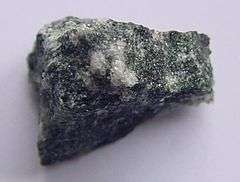Hsianghualite
| Hsianghualite | |
|---|---|
|
Hsianghualite from the type locality. Specimen size 1.5 cm | |
| General | |
| Category | Zeolite |
| Formula (repeating unit) | Li2Ca3(BeSiO4)3F2 |
| Strunz classification |
9.GB.05 (10 ed) 8/J.16-10 (8 ed) |
| Dana classification | 77.1.1.5 |
| Crystal system | Isometric |
| Crystal class |
Tetartoidal (23) H-M symbol: (23) |
| Space group | I213,[1] originally reported as 4 3 2[2] |
| Identification | |
| Formula mass | 475.4 g/mol |
| Color | White or colorless |
| Crystal habit | trisoctahedral or dodecahedral crystals or granular masses[2] |
| Cleavage | None |
| Tenacity | Brittle[3] |
| Mohs scale hardness | 6.5 |
| Luster | Vitreous |
| Streak | White |
| Diaphaneity | Transparent to translucent |
| Specific gravity | 2.97 to 3.00, measured[4] |
| Refractive index | n = 1.6132[2] |
Hsianghualite is a tectosilicate (framework silicate) of lithium, calcium and beryllium, with fluorine, a member of the zeolite group. It was discovered in 1958 and named for the type locality, Hsiang Hua, 香花, meaning fragrant flower.
Structure
Structure is analogous to that of analcime with Be and Si in tetrahedral co-ordination forming a three-dimensional framework.[1] Its space group is I213[1] (Previously reported as I4132[2]). Unit cell parameters are a = 12.879 or 12.897,[2][4] and Z = 8.
Environment
It occurs within phlogopite veins in the light-coloured band of green and white banded metamorphosed Devonian limestone which has been intruded by beryllium-bearing granite.[5] Associated mineral include fluorite, liberite, chrysoberyl, taaffeite and nigerite.[1]
Localities
Hsianghualite has been found only at the type locality, the Xianghualing Mine in Linwu County, Hunan Province, China.
References
- 1 2 3 4 Gaines et al (1997) Dana's New Mineralogy Eighth Edition
- 1 2 3 4 5 American Mineralogist (1959) 44:1327 English language abstract of Huang Yung-hwei, Tu Shaohua, Wang K'ung-hai, Chao Chun-Lin, and Yu Cheng-Chih (1958)Ti-chih-yueh-k'an 7: 35 (in Chinese)
- ↑ http://rruff.geo.arizona.edu/doclib/hom/hsianghualite.pdf
- 1 2 American Mineralogist (1961) 46:244. Data from A A Beus (1960) Akademii Nauk SSSR 1-329 (in Russian).
- ↑ Roberts, Campbell and Rapp (1990) Encyclopedia of Minerals, 2nd edition
